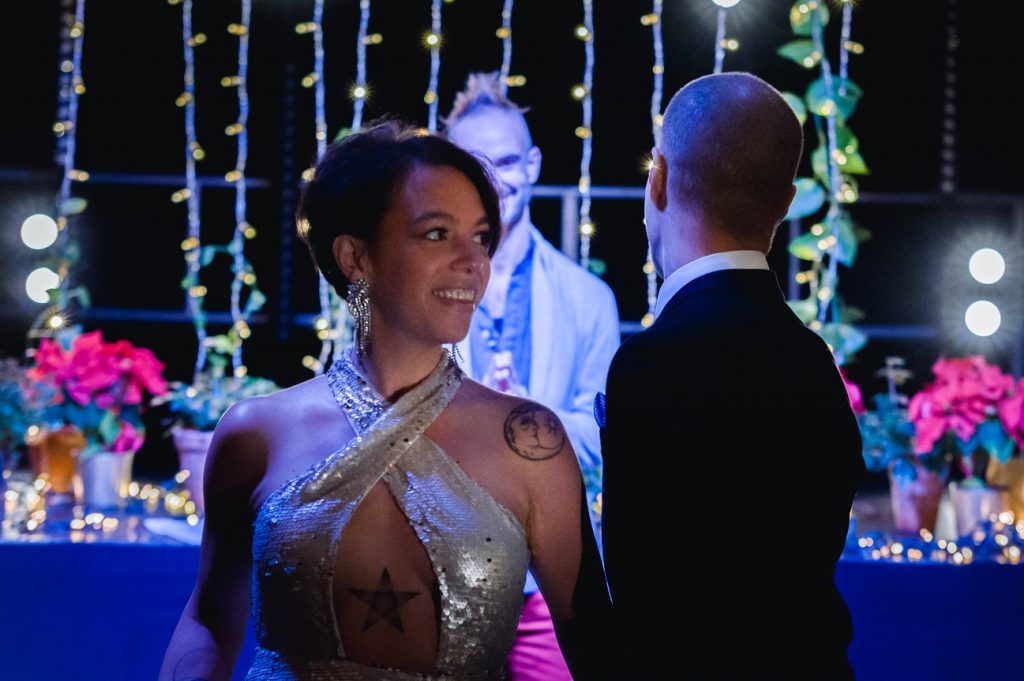When I married my partner at the end of last year, no aspect of the ritual was automatically included. As perpetual adventurers in consciousness, we felt into every decision about the day before making it and that called me to question my role as the bride. Despite every choice I made feeling deeply, intuitively good, some of them challenged me.
I don’t feel touched by patriarchy often. Mostly, I feel blessed, happy and empowered but taking part in this ritual added a new dimension to my experience. I felt the misogyny that’s baked into the traditional British wedding and it led me to discover a few wider truths about myself. When I sat down to consider my vows a few days before the ceremony, I found myself writing the following words instead.
When I get married this Saturday, no part of the day will use tradition by default. We’re not trying to prove any points; if something traditional feels good, we’ve included it. For example, my dad will make a speech, because he’s happy to do it and we both want to hear his voice at our wedding. Something he won’t be doing however, is walking me down the aisle.
Nothing about the idea of being given away feels good, or remotely relevant, to me. Nobody owns me, nor will they ever. I’m an adult, not a child being handed to a new guardian. Yet even now, there is a dull, background voice inside me asking ‘Is Dad going to feel as though he’s missed out on something? Is the simple act of walking down the aisle hand in hand with my partner too much of a statement?’ Rationally, I reflect that the act of being handed from one man to another like property is much more of a statement, even if it is hidden in plain sight by being an accepted part of the process.
Still, as uncomfortable as this is to admit, I have a nagging feeling that by going against tradition I am stepping out of line. Of course, that’s because I am. There is a line. That’s the problem.
We’re also planning to make a joint speech. This feels like a natural thing to do. People will be there as our guests. Why would I sit mute and allow someone to speak on my behalf? I’ve never done it before and have no desire to set that precedent. When grooms stand up at their wedding and begin their speech by saying ‘On behalf of my wife and I…’ and everybody claps, I don’t.* There may be times in life when I need my partner to advocate for me, in the case of absence or illness for example. I’m blessed to have someone I trust implicitly to do this but my wedding day is not one of those times.
Mention of a joint speech has provoked more implied (and actual) eye rolls and comments along the lines of ‘wow, really?’ or ‘I’d expect nothing less of you’ than any other aspect of the day. Every one of these responses has registered for me with a kind of low level discomfort. Almost every reaction, even from the most supportive of people, has made me question whether it is the right thing to do. I don’t mention that to criticise anyone for their response. I say it to admit a vulnerability within myself, that I didn’t previously realise was there. My decision to stand up next to Dave isn’t meant as a reclamation or a feminist protest. I simply want to offer my love and gratitude to family and friends. I don’t want that to be remarkable in any way but that’s not something I get to decide.
Here’s the statement I’ve been building to. I can’t get away from the feeling that maybe I’m taking up too much space at my own wedding. Am I going to be like the child in the nativity play who tries to turn Baby Jesus into a speaking part? It’s a feeling all too familiar to me, that I’m just ‘a bit too much’.
I’ve become increasingly aware with age that living my own inherent truth makes me conspicuous. I’m uncompromising when it comes to following my intuition. I have always been relatively incapable of doing something just because it’s a thing that people do, or it’s expected of me. I need a reason that resonates with me before I take action, otherwise I can feel as though I’m swimming upstream. It’s not my choice to shake anything up or blaze a trail but if either of those things become byproducts of me simply doing what comes naturally, whether that be in the planning or my wedding or anything else, then so be it. I used to be really, really uncomfortable about being noticed for the myriad little things that set me apart. Now, while I still feel some discomfort, it’s a low level hum that’s present below the bellowing satisfaction of being at peace with my decisions.
My life is easier – way, way easier – than most. I feel free and I recognise how privileged I am to feel that way. And the actions that we take matter. Every time any one of us chooses not to compromise themselves, they make it just that little bit more acceptable for others to do that. So I choose to believe that every time I make a decision that feels intuitively right, despite it making me feel noticed, judged or uncomfortable, that it ripples out into the world, where it just might help someone else to do the same.
* I don’t know how prevalent this is but I’ve heard grooms say it at at least 50% of the weddings I’ve been to.

